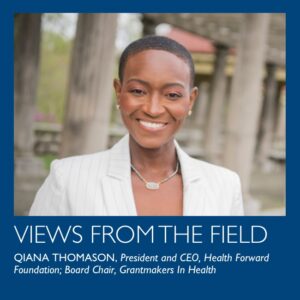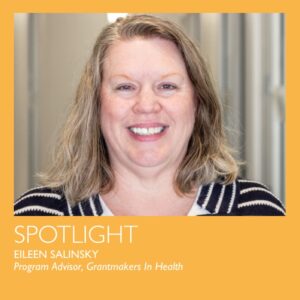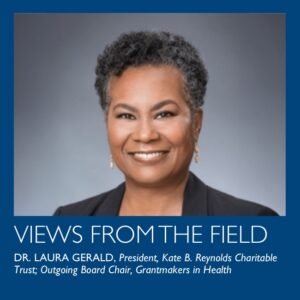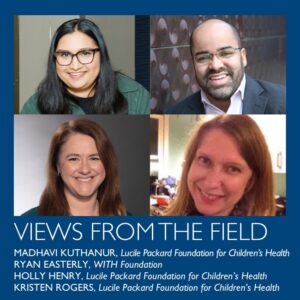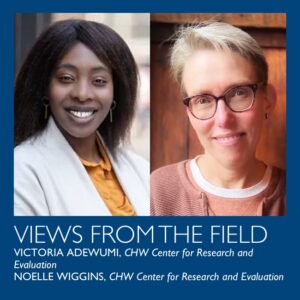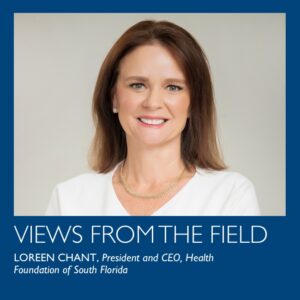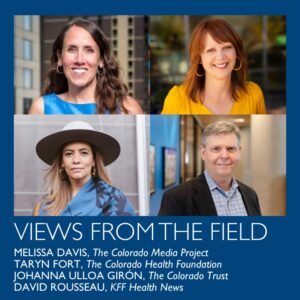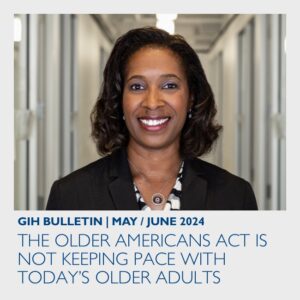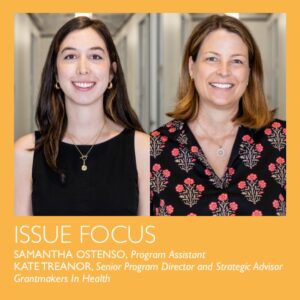GIH Bulletin: April 2025
In a time of intensive action to dismantle policies and practices that protect the well-being of all Americans, where chaos is the principal strategy to overthrow the will of and care for the American people, philanthropy must remain rooted in what is legally and morally right.
GIH Bulletin: March 2025
After 18 years at Grantmakers In Health, Eileen Salinsky, longtime Program Advisor and former Vice President for Program and Strategy, has announced her retirement. Her last day at GIH will be Friday, March 21, 2025. Eileen was recruited as GIH’s Vice President for Program and Strategy by former President and CEO Lauren LeRoy in 2007. Family obligations required Eileen to step back from her management position, but she stayed on part-time as a Program Adviser for almost two decades.
GIH Bulletin: January/February 2025
At the Kate B. Reynolds Charitable Trust, this has been a challenging year for North Carolina, where we live and work. Hurricane Helene devastated the western part of NC and the surrounding region, and we endured an election that divided our state and nation. We also know that we are not alone facing the challenges of 2024 and those we will take on in 2025. Many of us in the Grantmakers In Health (GIH) community are wondering how to persevere through these uncertain times. At the Trust, we acknowledge the heaviness of the moment—because we anticipate policy changes that will negatively impact people who are already being left behind.
GIH Bulletin: November/December 2024
One in five children in the United States has a special health care need requiring more than routine health services, and one in four adults report having a disability. As 70 million adults and 14.5 million children in the United States have a disability, the population impacted by issues in the aging out process and in the health care system more broadly is far from insignificant. Despite these numbers, disability-related grants represent just 2 percent of total philanthropic giving and are primarily directed towards services and supports that seek to fix or cure disabilities and perpetuate the ableist assumption that people with disabilities are unable to make decisions about their own care.
GIH Bulletin: October 2024
Community Health Workers (CHWs)—frontline public health professionals who have a unique and trusted relationship with the communities they serve—have proven their ability to help create just, equitable, and thriving communities. As a CHW for over a decade and a CHW ally for over 35 years, we have never witnessed a time of greater interest and investment in the CHW workforce. Amidst a rapidly changing CHW funding landscape, the philanthropic community has an important role to play in assuring that CHWs are able to make an optimum contribution to communities and to the health system.
GIH Bulletin: September 2024
When basic social needs go unmet, they become the principal drivers of health disparities. Recognizing this, the Health Foundation of South Florida has been advancing a collaborative approach that brings together health systems and community-based organizations and paves the way for implementing promising social interventions. Through this approach, the Health Foundation seeks to drive improved health outcomes and greater coordination to address unmet health-related social needs within clinical care settings.
GIH Bulletin: August 2024
Each year, more than two million low-income, uninsured, and underinsured people in the United States rely on approximately 1,400 nonprofit free and charitable clinics and charitable pharmacies for essential health care. These clinics use a volunteer/staff model to provide a wide range of health services including medical, dental, pharmacy, vision, and behavioral health services. Many clinics also address social needs, such as connecting patients to housing, food assistance, or employment assistance programs.
GIH Bulletin: July 2024
In an era marked by profound societal divisions, the role of local media in fostering democratic health stands as a cornerstone of informed civic engagement. From critical issues like health care and housing to economic opportunity and climate impacts, local journalism is the bedrock upon which communities build their understanding and response. Yet, the field faces challenges beyond the well-documented financial crisis facing local newsrooms, encompassing deep-rooted inequities in newsroom composition and the narratives they convey.
GIH Bulletin: May/June 2024
In 1965, the Older Americans Act was a beacon of successful bipartisan legislation to address the social, economic and health needs of older Americans on a national level. Nearly 60 years later, the act has changed little, yet life for older adults and what it takes for them to thrive has changed significantly. This fall, the act is up for reauthorization — providing Congress an opportunity to give it a long overdue modernization to ensure it can meet the needs of older Americans today.
GIH Bulletin: April 2024
In 2019, MacKenzie Scott announced that she was stepping into the world of philanthropy to give away her multi-billion-dollar fortune “until the safe is empty.” She has kept her word—to date, she has given away $16.5 billion. Her initial process for choosing which organizations would receive grants was shrouded in mystery. From 2019 to 2023, Scott used a process she termed “quiet research” to identify possible grantee organizations. The lucky organizations received a call from Scott’s consultants, who let them know they were receiving a grant for immediate use however they would like to spend it. In the Fall of 2022, Grantmakers In Health (GIH) became one of those grantee organizations, along with more than 20 health foundations. Two additional GIH Funding Partner organizations received gifts in 2020 and 2021, respectively.

